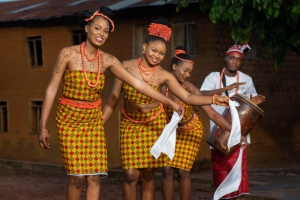Mauritius is a melting pot of cultures, with influences from Indian, African, Chinese, and European traditions. Its rich heritage is reflected in the island’s customs, festivals, and daily life. Understanding and respecting local etiquette not only helps you avoid misunderstandings but also allows you to connect more deeply with Mauritians. Whether you’re exploring vibrant markets, attending a cultural festival, or visiting local villages, here’s what you need to know about customs and etiquette in Mauritius.
1. Greetings & Social Etiquette
Table of Contents
Toggle✅ Handshakes: A light handshake is the standard greeting, often accompanied by a smile. Among close friends and family, hugs or cheek kisses (air kisses) are common.
✅ Using Titles: Politeness is important. Use “Mr.” or “Mrs.” in English, or “Monsieur/Madame” in French, especially in formal settings.
✅ Polite Conversation: Mauritians are generally warm and welcoming. A friendly “Bonzur” (Hello in Creole) or “Bonjour” (French) is always appreciated.
✅ Respectful Body Language: Smiling and being polite go a long way. Avoid overly aggressive gestures or raising your voice in public.
2. Respect for Culture & Religion
Mauritius is a multi-religious society, with Hinduism, Christianity, Islam, and Buddhism practiced widely. Respect for religion and traditions is central to local life.
🚨 Customs to Observe:
❌ Dress modestly when visiting temples, mosques, or churches—cover shoulders and knees.
❌ Remove shoes before entering a temple or mosque.
❌ Avoid public displays of affection in religious or rural areas.
✅ Festivals such as Diwali, Eid, Chinese New Year, and Cavadee are celebrated with great enthusiasm—tourists are often welcome to join, but always be respectful.
🚀 Pro Tip: If invited to a religious or cultural event, ask your host about proper dress and etiquette before attending.
3. Respect for Elders & Hospitality
✅ Elders are highly respected in Mauritian families. Always greet the eldest person first.
✅ Hospitality is a core value—if you’re invited to a Mauritian home, it’s polite to accept, even if only for tea or snacks.
✅ Gifts are appreciated but not required. If you bring one, small items like sweets, wine, or flowers are a nice gesture.
4. Dress Code & Modesty
While Mauritius is a popular beach destination, modesty is appreciated away from the resorts.
👕 General Dress Code:
✅ Casual, light clothing is fine in towns, but avoid overly revealing outfits when not at the beach.
✅ When visiting temples, mosques, or churches, dress conservatively—long skirts/trousers and covered shoulders.
✅ Business settings usually require smart-casual or formal dress.
🌊 Beachwear Etiquette:
✅ Swimwear is acceptable on beaches, but not in towns or markets. Cover up with a sarong, t-shirt, or light dress when leaving the beach.
5. Visiting Homes & Villages
✅ Remove shoes before entering a home if the host does so—it’s a sign of respect.
✅ A small gift, like pastries, fruit, or tea, is thoughtful when invited to a meal.
✅ Wait to be shown where to sit and do not begin eating until your host invites you to start.
🏡 Village Customs: In smaller communities, greet people with a smile or nod as you pass. Mauritians value friendliness and respect toward neighbors and visitors alike.
6. Dining Etiquette
Mauritian meals are often a social occasion, blending Indian, Creole, Chinese, and French traditions.
✅ Wash hands before eating, especially if sharing family-style meals.
✅ Wait for the host or eldest person to begin eating before you do.
✅ If food is offered, it’s polite to try a small portion, even if you’re not very hungry.
✅ Eating with the right hand is common in Indian households, but cutlery is widely used across the island.
🍛 Traditional Foods to Try:
- Dholl Puri: Soft flatbread filled with split peas.
- Rougaille: Creole-style tomato-based dish, usually with fish or sausage.
- Briani: Fragrant spiced rice, a favorite in Muslim communities.
- Gateaux Piment: Fried lentil chili cakes, a popular street snack.
7. Language & Communication
Mauritius is multilingual, and you’ll hear several languages spoken in daily life.
✅ Official Language: English (used in administration and schools)
✅ Widely Spoken: French and Mauritian Creole (Kreol Morisien)
✅ Common Phrases in Creole:
- Hello: Bonzur
- Thank you: Mersi
- Please: Silvouplé
- Goodbye: Orevwar
- How much is this? Kombien sa?
🚀 Pro Tip: While most Mauritians understand French and English, using a few Creole words shows effort and respect.
8. Tipping & Bargaining Etiquette
💰 Tipping: Not obligatory, but appreciated in the service industry.
✅ Restaurants: 5–10% of the bill if no service charge is included.
✅ Taxi Drivers: Round up the fare or add a small tip for longer rides.
✅ Tour Guides & Hotel Staff: Rs 100–200 per day is a thoughtful gesture.
🛍️ Bargaining:
✅ Common in markets and with souvenir vendors, but not in supermarkets or shopping malls.
✅ Always negotiate with a smile—bargaining is seen as friendly interaction rather than confrontation.
Conclusion
Understanding Mauritius’ customs and etiquette will help you blend in and enjoy more authentic experiences during your stay. By greeting people politely, respecting religious practices, and showing modesty in behavior and dress, you’ll be welcomed with warmth and friendliness.
🌍 Final Tip: Embrace Mauritius’ cultural diversity—whether it’s sharing a home-cooked meal, joining a festival, or simply chatting in a market, your respect and openness will create memorable connections. Mersi & Orevwar! (Thank you & Goodbye!)




